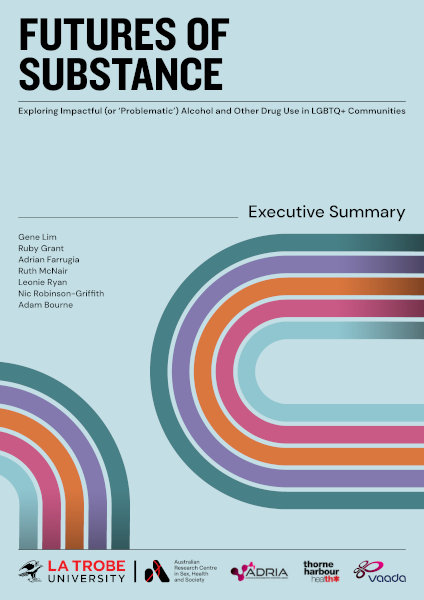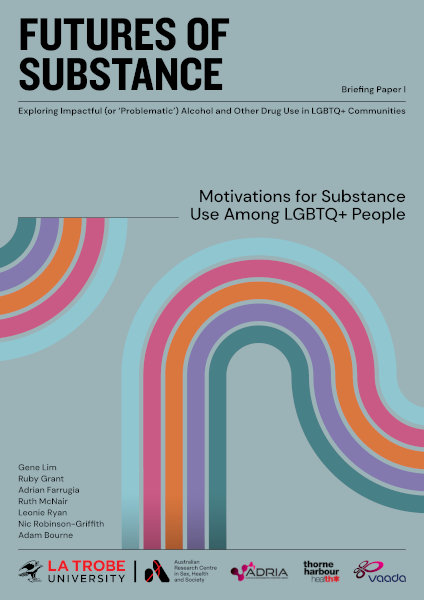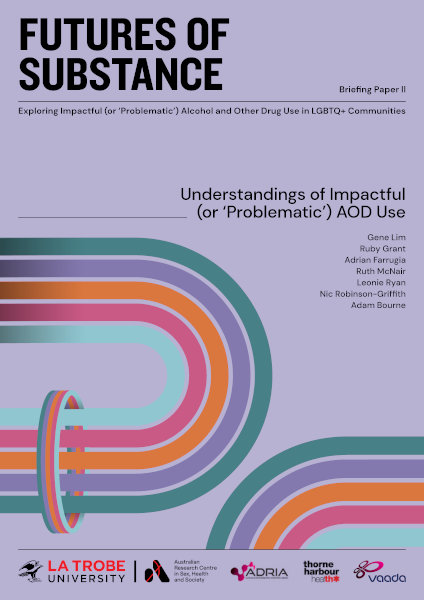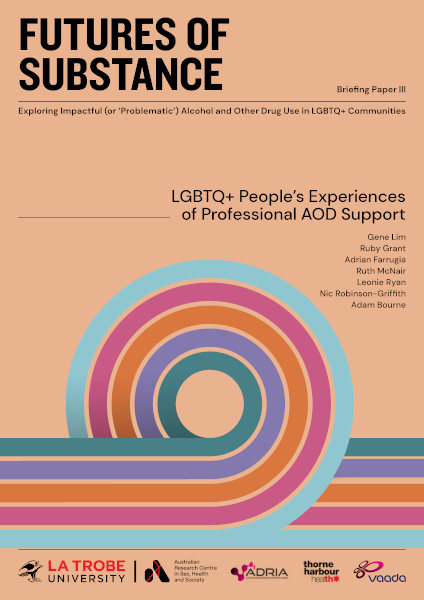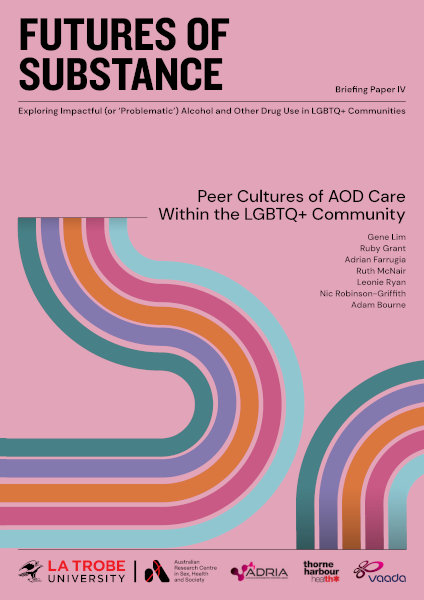Futures of substance

Exploring LGBTIQ+ people's determinations of ‘problematic’ use
2024
Gene Lim, Ruby Grant, Leonie Ryan, Adrian Farrugia, Ruth McNair , Adam Bourne
This study, conducted in partnership with Thorne Harbour Health, investigates lesbian, gay, bisexual, transgender, intersex and queer (LGBTIQ+) people’s experiences with and understandings of alcohol and other drug use, with a focus on how LGBTIQ+ people who use alcohol and other drugs come to view their use as a concern, and how they seek support.
LGBTQ+ people use alcohol and other drugs (AODs) at higher rates than the general population, and generally begin using substances at a younger age.
Not all substance use is ‘problematic’, and LGBTQ+ substance use can be motivated by culturally specific reasons.
Substances can be a way for LGBTQ+ people to cope with discrimination, but they can also be a way to explore their sexuality and gender, and can be an important part of specific sexual subcultures.
Nevertheless, LGBTQ+ populations experience higher rates of problematic use compared to the general population, and this contributes to poorer health outcomes among some LGBTQ+ people.
In Australia, the LGBTQ+ community is recognised as a priority population in both state and federal AOD strategies, but continues to face significant challenges in accessing culturally competent treatment.
Briefing Papers
Futures of Substance: Exploring impactful (or 'problematic') alchol and other drug use in LGBTQ+ communities - Executive summary
A summary of the Futures of Substance project's background and purpose, methods, findings, and key recommendations for policy/systems, health promotion and service providers/service workers.
Futures of Substance Briefing paper 1 - Motivations for substance use among LGBTQ+ people
This first factsheet specifically explores motivations for substance use, which provides essential grounding context about how LGBTQ+ individuals engage not only with substances, but also their support needs.
Expectations about a substance’s effects are often shaped by a combination of life experiences, social influences, and social messages about that substance.
In turn, how one views the consequences of using a substance - and how much they’re willing to tolerate - is also shaped by these expectations and one’s motivations for using that substance.
Some of these motivations are common across all populations, whereas some are more specific to, or entirely distinct, among LGBTQ+ people.
Futures of Substance Briefing paper 2 - Understandings of impactful (or 'problematic') AOD use
This factsheet explores how LGBTQ+ people come to understand their substance use as impactful.
Participants described how recognising their use as impactful played an important role in shaping when and how they sought support, prompting reflection on their relationship to substance use, and how it impacted the way they interacted with others.
Importantly, participants emphasised that impactful and non-impactful substance use could co-exist.
There wasn’t always a clear or linear progression from non-impactful to impactful use - substance use could become intermittently impactful, and even then, professional support was not always considered necessary.
Futures of Substance Briefing paper 3 - LGBTQ+ people's experiences of professional AOD support
Impactful use was linked to many relational, occupational, legal and health-related challenges that eventually outweighed the benefits of using substances, motivating participants to access professional support.
Participants described key factors that helped them engage with support services, benefit from therapy, and build strong
relationships with providers.
Futures of Substance Briefing paper 4 - Peer cultures of AOD care within the LGBTQ+ community
This factsheet explores how peer cultures of care function within the LGBTQ+ community.
Engaging with professional support was an important part of how participants managed their impactful use, but long-term change often depended on their ability to self-manage.
This could be challenging for participants, as substance use is both widespread and highly normalised within the LGBTQ+ community.
However, participants’ experiences also showed that LGBTQ+ peers and the broader community were an important source of support.
For further information
Dr. Gene Lim
Research Officer
glim@ltu.edu.au
Ethics Reference Number HEC24041
Senior Research Ethics Officer
+61 3 9479 1443
humanethics@latrobe.edu.au
Funding
This project is funded by the Alcohol and Drug Research Innovation Agenda (ADRIA), an initiative of the State Government of Victoria, and is conducted in partnership with Thorne Harbour Health and VAADA.

